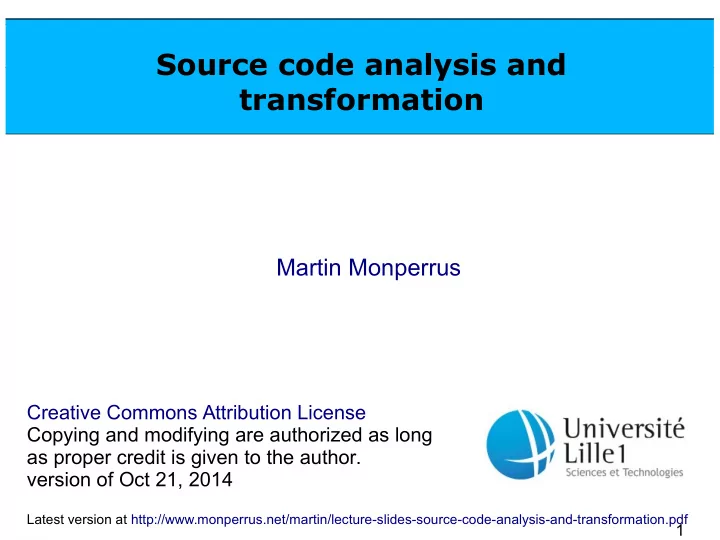

Source code analysis and transformation Martin Monperrus Creative Commons Attribution License Copying and modifying are authorized as long as proper credit is given to the author. version of Oct 21, 2014 Latest version at http://www.monperrus.net/martin/lecture-slides-source-code-analysis-and-transformation.pdf 1
Slide contents ● Concepts: ● Abstract Syntax Tree ● Source code analysis ● Lint tools ● Source code transformation ● Tools ● Spoon: a Java library for analyzing and transforming Java source code 2
An Example Bad practice, should be either: try { ● throw new RuntimeException(e); ● Log.log(e) // some code } catch (Exception e) { e.printStackTrace(); } Analysis 3
An Example try { Text search (Grep): // some code grep "e.printStackTrace"? } catch (Exception e) { What if: e.printStackTrace(); th.printStackTrace(); ? } How to check empty catch blocks? Text search: False positives, false negatives 4
Astract Syntax Tree ● An Abstract Syntax Tree is a data structure representing source code. Libraries exist to compute and manipulate ASTs. 5
Astract Syntax Tree ● There can be many different ASTs for he same programming language ● Use enum instead of classes ● Groups nodes together or not ● An AST is designed for a given task (compilation, interpretation, code query, metrics, etc.) 6
Tools for analyzing Astract Syntax Trees There are many tools for extracting and analyzing ASTs: ● Spoon (Inria) ● SrcML (Java/C++ to XML) ● JDT ● AST (Python library) ● Clang (frontend of the compiler) 7
Example: Spoon Spoon provides Java ASTs (and a GUI to navigate through them) java spoon.Launcher -g -i srcDir public class Dojo { public int b; public double c; void foo(Object t, int i) { t.hashCode(); b=i+3; b=i-5; b=i-98; b=b+i; } } 8
Example: SrcML SrcML provides XML-based ASTs that can be analyzed with any DOM technology <unit> <comment type="line">// copy the input to the output</comment> <while>while <condition>(<expr><name><name>std</name>::<name>cin</name></name> >> <name>n</name></expr>)</condition> <expr_stmt><expr><name><name>std</name>::<name>cout</name></name> Spoon provides a GUI to navigate through ASTs << <name>n</name> << '\n'</expr>;</expr_stmt></while> </unit> ● Pro: toString is valid code ● Pro: Can be loaded in any XML ready library ● Con: no complete AST (very fine grain expressions are not handled) 9
AST Read versus Write ● An AST can be accessed in read and write mode. ● Static analysis is done in read mode ● Source code transformation is done in write mode ● methods: insertBegin, insertEnd, insertBefore, insertAfter, replace 10
Source Code Analysis 11
AST analysis AST analysis is useful is a number of different use cases: ● Lint tools / Bad smells ● Lint, FindBugs, PMD, Checkstyle, JLint ● Verification of contracts ● e.g. no explicit exception reaches the main ● Visualization 12
Origins of Lint ● Lint first appeared in the seventh version (V7) of the UNIX operating system in 1979. ● Lint flagged some suspicious and non- portable constructs in C language source code. ● use before definition ● unreachable code ● ignored return values ● etc. 13
Basics of AST Analysis: navigation and query // navigation class .getFields() field.getDefaultExpression() if .getThenBranch(); method.getBody(); ... // queries list1 = methodBody.getElements( new TypeFilter(CtAssignment.class)); // collecting all deprecated classes list2 = rootPackage.getElements( new AnnotationFilter( Deprecated .class)); // creating a custom filter to select all public fields list3 = rootPackage.getElements( new AbstractFilter<CtField>(CtField.class) { public boolean matches(CtField field) { return field.getModifiers.contains(ModifierKind.PUBLIC); }}); 14
Spoon Analysis #1: Detecting empty catch blocks public class CatchProcessor extends AbstractProcessor<CtCatch> { public void process(CtCatch element) { if (element.getBody().getStatements().size() == 0) { getFactory().getEnvironment().report( this , Severity. WARNING , element, "empty catch clause"); } } } $ java -cp spoon.jar spoon.Launcher -i sourceFolder -p CatchProcessor 15
Spoon Analysis #2: Detecting public fields public class PublicFieldProcessorWarning extends AbstractProcessor<CtField<?>>{ @Override public void process(CtField<?> arg0) { if (arg0.hasModifier(ModifierKind. PUBLIC )) { getEnvironment().report( this , Severity. WARNING , arg0, "Found a public field"); } } } 16
Source Code Transformation 18
API for code transformation A source code transformation tool provides you with an API. Scope Name Description generic replace(element) replaces an element by another one. generic insertBefore(eleme inserts the current element ("this") before another element nt) in a code block. generic insertAfter(element) inserts the current element ("this") after another element in a code block. block insertBegin(element adds an element at the begin of a code block. ) block insertEnd(element) appends an element at the end of a code block. throw setThrownExpressi sets the expression returning a throwable object. on(expr) assignment setAssignment(expr sets the expression to be assigned in a variable. ession) if setElseStatement(s sets the "else" statement of an if/then/else. tmt) Excerpt of Spoon's transformation API 19
Spoon Transformation #1: adding not-null checks public class NotNullCheckAdderProcessor extends AbstractProcessor<CtParameter<?>> { @Override public boolean isToBeProcessed(CtParameter<?> element) { return !element.getType().isPrimitive();// only for objects } public void process(CtParameter<?> element) { // we declare a new snippet of code to be inserted CtCodeSnippetStatement snippet = getFactory().Core().createCodeSnippetStatement(); // this snippet contains an if check snippet.setValue("if(" + element.getSimpleName() + " == null " + ") throw new IllegalArgumentException( \"[Spoon inserted check] null passed as parameter\");"); // we insert the snippet at the beginning of the method boby element.getParent(CtMethod.class).getBody().insertBegin(snippet); } } 20
Spoon Transformation #2 (driven by annotations) public @interface Bound { double min(); } public void openUserSpacePort(@Bound(min = 1025) int a) { // code to open a port } public class Bound2Processor extends AbstractAnnotationProcessor<Bound, CtParameter<?>> { public void process(Bound annotation, CtParameter<?> element) { // we declare a new snippet of code to be inserted CtCodeSnippetStatement snippet = getFactory().Core() .createCodeSnippetStatement(); // this snippet contains an if check snippet.setValue("if(" + element.getSimpleName() + " < " + annotation.min() + ")" +" throw new RuntimeException(\"[Spoon check] Bound violation\");"); // we insert the snippet at the beginning of the method boby element.getParent(CtMethod. class ).getBody().insertBegin(snippet); } // end process } 21
Summary ● Source code analysis and transformation is powerful for automating parts of the development process ● Is sometimes more powerful at the abstract syntax tree level ● Spoon is Java library for analyzing and transforming Java source code 22
Recommend
More recommend